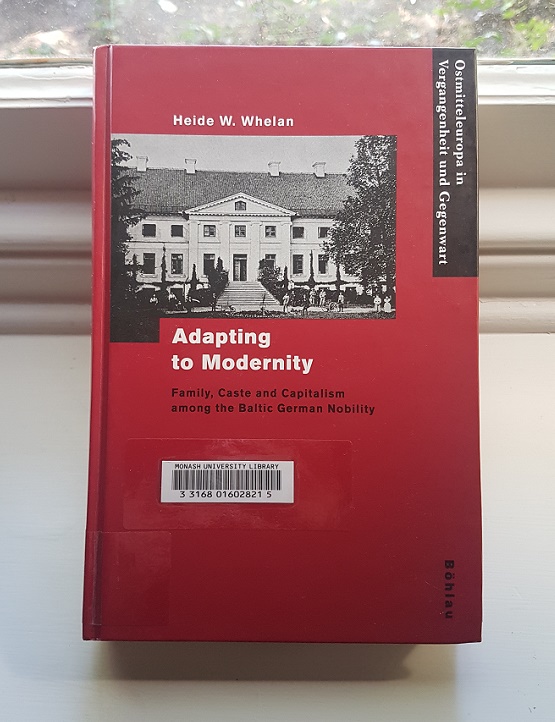There was good news and bad news when I discovered “Adapting to Modernity” by Heide W Whelan in the library. The good news, apart from the fact it is in English, was that it is the best resource I’ve found so far in my research about my father’s family. The bad news is it is out of print. It seems as if the only copy in the world is the one I have now borrowed for the second time from the library.
“Adapting to Modernity”, subtitled Family, Caste and Capitalism among the Baltic German Nobility, looks at the history of the Baltic Germans prior to 1918. It also describes family life, childhood, education, love, marriage, careers and even etiquette. It is truly a mine of information. Reading this book has given me a clear insight into the life my father’s family were born into. It has filled in the gaps and answered many of my questions of why my father acted or spoke in the way he did.
It was lovely to read passages such as this:
“The mother was the center of the household. She was the ‘calming pole’ and ‘soul of the house’ for the family and in charge of its overall well being.” (pg 170)
And this, noted by one Alexander von Igelström:
“We certainly received a great treasure from our loving parents, especially from our magnificent love-breathing, forbearing, and indulgent mother, and this treasure was love, love for our family, love for our home, love toward others that was communicated through intimate intercourse among ourselves.’ (pg 165)
This passage explained my father’s attitude to me when I was growing up:
“The father was the head of the family to whom children owed ‘respect’ and who expected from his offspring the order and discipline that he himself had usually experienced in military service.’ It goes on to add “daughters also were expected to regard him with reverence.” (pg 169)
This was obviously the way my father was brought up, respecting and I believe to some extent fearing, his father and doting on his mother. His mother was ill most of his life, she suffered from asthma, an illness she eventually died of when my father was only a teenager. Her death left him in the care of his father, who obviously had no idea what to do with him or his brother. If you add in the fact that the Baltic German nobility lost their homes and possessions because of the Latvian War of Independence, and you have a recipe for a lost childhood and an adult who grew up in poverty, with no real example of parenting. No wonder we had issues!
I wish I could find a copy of the book to keep. There is a website where it can be downloaded, chapter by chapter, for quite a lot of money, which is not affordable. But I’m happy I found the book in the library and have a chance to read it. Sometimes you don’t need to possess something for it to make a difference in your life.




